Media Report

- The Washington Post reports, "President Trump raised the possibility that a U.S. dispute with Chinese telecom giant Huawei could be resolved as part of a trade deal, days after his administration cut off U.S. technology sales to the company, calling it a national security threat. Responding to questions from a reporter Thursday afternoon, Trump called Huawei 'very dangerous,' but also said White House concerns about the company could be wrapped into its tense trade talks with Beijing. 'Huawei is something that's very dangerous. You look at what they've done from a security standpoint, from a military standpoint, it's very dangerous,' Trump said. 'So it's possible that Huawei even would be included in some kind of a trade deal. If we made a deal, I could imagine Huawei being possibly included in some form of, or in some part of, a trade deal.' Asked how that might work, Trump added: 'It's too early to say, but I mean, we're just very concerned about Huawei from a security standpoint.'"
- The New York Times:China's Supply of Minerals for iPhones and Missiles Could Be a Risky Trade WeaponThe New York Times reports, "President Xi Jinping of China strode this week through a high-ceilinged factory that makes magnets out of rare earths, minerals that are essential to global manufacturing and a sector that his country dominates. His top trade negotiator, Vice Premier Liu He, stood near. Mr. Xi did not threaten to block supplies of rare earths to the United States. He didn't have to. The veiled threat, broadcast over state-run news media this week as President Trump ratcheted up his trade war against Beijing, was clear. China's command of the rare-earth market could give Beijing a way to strike back at Mr. Trump as he raises tariffs and deprives Chinese companies of the technology they need to survive. A similar move by China nine years ago, against Japan over a territorial dispute, shocked manufacturers around the world, sent prices soaring and revealed Beijing's control of an essential part of the global supply chain."
- Reuters reports, "The Trump administration on Thursday unveiled a $16 billion farm aid package to offset losses from a 10-month trade war with China and said payment rates to farmers would be determined by where they farm rather than what crops they grow. The package, the bulk of which will be spent on direct payments, surprised growers and traders who had expected to learn separate payment rates for soybeans, hogs, corn and other crops in the Department of Agriculture (USDA) briefing. Many farm groups welcomed the move, but called for a trade deal with China as soon as possible. Some Democrats have slammed the plan, calling it a 'band-aid' and said the county-based payment system could leave some farmers with reduced aid. Farmers, a key constituency that helped carry U.S. President Donald Trump to his 2016 electoral win, have been among the hardest hit from a trade dispute with China, once a destination for more than 60 percent of U.S. soybean exports."
Calendar
- 2019-05-22 Trump administration considers banning another major Chinese firm
- 2019-05-21 U.S. Restrictions on Huawei Expose a High-Tech Achilles’ Heel for China
- 2019-05-20 As Huawei Loses Google, the U.S.-China Tech Cold War Gets Its Iron Curtain
- 2019-05-19 Rural America feels the sting of Trump's China trade war
- 2019-05-17 I.M. Pei, Master Architect Whose Buildings Dazzled the World, Dies at 102
- 2019-05-16 China Arrests 2 Canadians on Spying Charges, Deepening a Political Standoff
- 2019-05-15 Trump Moves to Ban Foreign Telecom Gear, Targeting Huawei and Escalating Battle With China
- 2019-05-14 U.S. prepares to slap tariffs on remaining Chinese imports,
- 2019-05-13 Trade row deepens as China ups tariffs on $60B in US goods
- 2019-05-10 Trump Renews Trade War as China Talks End Without a Deal
News
- The Washington Post Trump calls Huawei 'dangerous' but says dispute could be resolved in trade deal
- The New York Times China's Supply of Minerals for iPhones and Missiles Could Be a Risky Trade Weapon
- Reuters U.S. $16 billion farm aid program to help expand markets: USDA's Perdue
- The Washington Post 2 US warships sail through Taiwan Strait, draw China protest
- The Washington Post Taiwan navy holds drill amid China tensions
- The New Yorker A Political Economist on How China Sees Trump's Trade War
- Reuters Hungary criticizes western Europe's 'hypocrisy' on China trade
- Forbes The U.S.-China Trade War Enters Uncharted Waters
- Bloomberg Tesla Plunges as Analyst Delivery Warning Adds to Week of Losses
- Politico Trump planning more restrictions on tech exports to China
- Bloomberg Russia's Newest Ambition in China Is Selling Chicken Wings
- CNBC A growing number of Chinese consumers are switching from Apple's iPhone, paper says
- The Wall Street Journal Chinese Fugitive Living Large in Los Angeles
Commentary
- Financial Times Why China doesn't want to breach its renminbi red line
- The New York Times China's Orwellian War on Religion
- Financial Times Emerging markets suffer collateral damage from trade war
- Bloomberg U.S. and China Go Their Own Ways With AI
- CNN No, China is not paying for Trump's bailout for US farmers
- The Washington Post What Congress can do now to combat China's mass ethnic cleansing of Uighurs